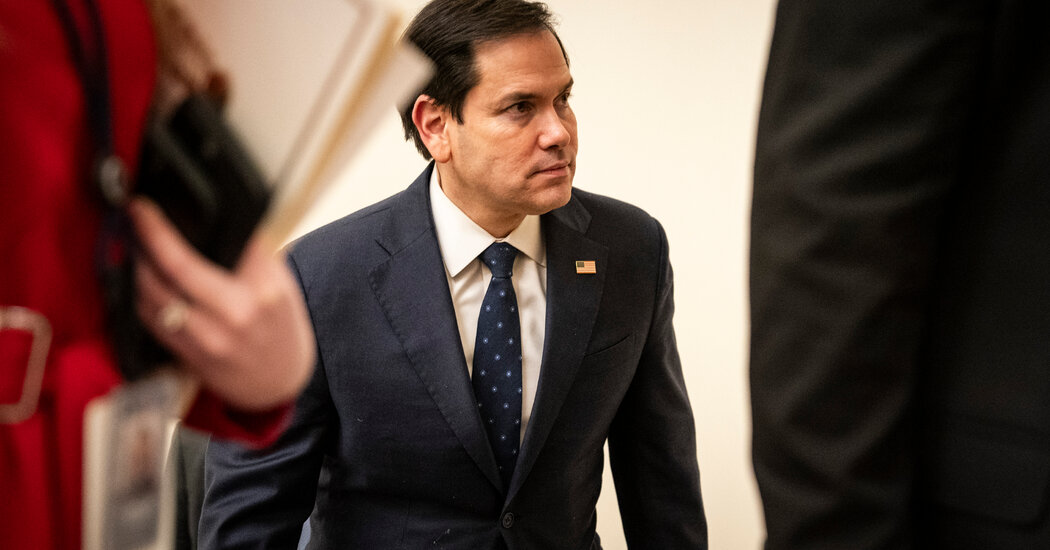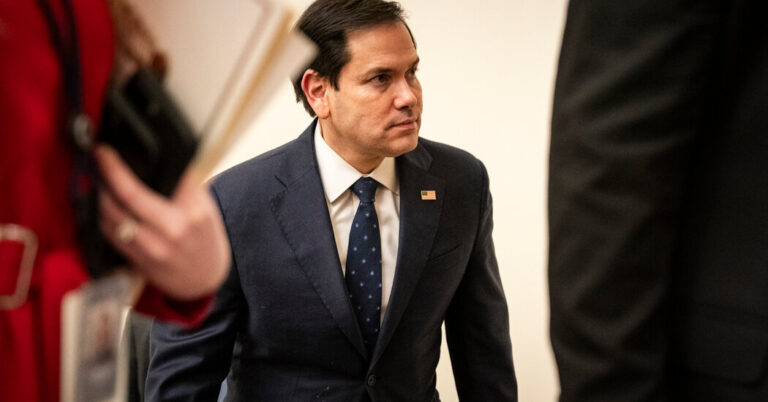State secretary Marco Rubio ordered diplomats abroad to examine the content of social media of some candidates for students and other types of visas, in an attempt to prevent those who suspected of criticizing the United States and Israel from entering the country, affirm the US officials.
Mr. Rubio presented the instructions in a long cable sent to diplomatic missions on March 25th.
The move came nine weeks after President Trump signed the executive orders to start a campaign to expel some foreign citizens, including those that could have “hostile attitudes” against “citizens, culture, government, institutions or founding principles”.
Trump also issued an executive order to start a repression of what he called anti -Semitism, which includes the deportation of foreign students who took part in the protests of the campus against the Israel war in Gaza.
Rubio’s Directive said that starting immediately, consular agents must refer to certain visa candidates for students and exchanged for the “fraud prevention units” for a “mandatory social media control”, according to two American officials with knowledge of the cable.
The fraud prevention unit of the section of an embassy or consulate for consular affairs, which emits visas, helps screening candidates.
The cable described the large parameters that diplomats should use to judge if a visa. He mentioned observations that Mr. Rubio made in an interview with the CBS News on March 16: “We don’t want people in our country who will commit crimes and weaken our national security or public security,” he said. “It’s so simple, in particular people who are here as guests. Here is a visa.”
The cable specifies a type of candidate whose social media posts should be examined: someone who is suspected of having terrorist ties or sympathies; who had a student or an exchange visa between 7 October 2023 and 31 August 2024; Or who has finished a visa since that date of October.
Hamas attacked Israel southern on October 7, 2023, killing 1,200 Israelis and taking about 250 hostages. This turned on a war in which Israel made aerial attacks and an invasion of Gaza to the ground that killed over 50,000 Palestinians, according to the estimates of the Gazan Ministry of Health.
The dates specified by Mr. Rubio in the cable indicate that one of the main objectives of social media research is to refuse the applications of students who expressed sympathy for the Palestinians during the war.
The cable also states that candidates can be denied a visa if their behavior or actions show that they have “a hostile attitude towards US citizens or American culture (including the government, institutions or founding principles)”.
This formulation could stimulate foreign citizens to self -censors many types of speeches to avoid jeopardizing their possibilities of obtaining a visa.
And the US consular officers could have difficulty judging the past statements and posts on social media of a applicant, especially if they do not know the adequate context.
Some foreign citizens who have a critical vision of US policies could renounce the request for a visa, which is a favorite result declared by Mr. Rubio.
The required types of visa that would unleash extra control are F, M and J – Visit for visitors for students and exchanges, the cable said.
The details of the cable were reported for the first time by the trash, an independent news site.
A spokesman for the State Department, when a comment was asked, said that the agency did not discuss the internal resolutions. They stressed that in 2019 the Department modified the visa demand modules to ask for information on social media accounts.
Tuesday, the former president of Costa Rica, Oscar Arias, told journalists that the United States government had sent him an E -mail saying that he was suspending a visa on his passport that had allowed him to enter the United States. Weeks ago, Mr. Arias declared on social media that Mr. Trump was behaving as “a Roman emperor”. Mr. Arias, winner of the Nobel Peace Prize, is the most important foreign citizen who revokes the visa so far.
As Senator della Florida, Rubio pressed the Department of State of the Biden Administration, managed by Antony J. Blinken, to cancel the views of the students involved in the protests of the campus against the military campaign of Israel in Gaza. Since he became secretary of state at the end of January, Rubio has revoked perhaps 300 or more viewed, many of whom belongs to the students, he told journalists last Thursday. He said he had signed the letters by revoking the visas daily.
“My standard: if we knew this information about them before giving them a visa, would we have allowed them to enter?” he said. “And if the answer is no, then we revoke the visa.”
At the beginning of that day, responding to the question of a journalist, Rubio said that the students “go beyond demonstration. They are going and are creating a Ruckus. They are creating revolts, in essence, on the campus”.
“Each of them I find, we chase them,” he added.
A spokesman for the State Department declared in an e-mail in mid-March that “all available technology” was used for screening of candidates seen and visa holders. The spokesman was answering a new York Times question if the Department was using artificial intelligence to scan the databases and social media posts to find holders of visas that, in the eyes of Trump, should be revoked.
After signing the revocation letters, Rubio sends them to the National Security Department. The Department has sent agents to retain some of the foreign citizens who have been stripped of their visas or, in some cases, their status as a permanent resident of the United States, commonly known as the owner of green cards.
At the beginning of March, Rubio notified the National Security officials to have revoked the permanent residence status of Mahmoud Khalil, 30 years old, who recently obtained a degree from Columbia University and was born in Syria and Yunseo Chung, 21 years old, a degree from Columbia who was born in South Korea. He mentioned a statute of the immigration that allows him to recommend for the deportation of anyone whose presence would have “potentially serious consequences of foreign policy for the United States”.
Khalil is married to an American citizen and Mrs. Chung lives in the United States since she was 7 years old.
Last week, half a dozen federal agents dressed in black, some who wore masks, torn Rumeysa Ozturk, a Turkish graduate student from Tufts University, off a road in Somerville, Massachusetts, and brought it to a detention center. Mr. Rubio later said he had revoked the visa for students.
Mrs. Ozturk wrote an essay for a student newspaper last year asking for university support for Palestinian rights and the divestment from Israel.
“At some point I hope we exhaust because we got rid of all of them,” said Rubio last Thursday. “But we are looking for these madmen every day who are snatching things.”
He added: “I encourage each country to do it, by the way, because I think it is crazy to invite students to your country who are entering your campus and destabilize it”.
Michael Crowley Contributed relationships.





